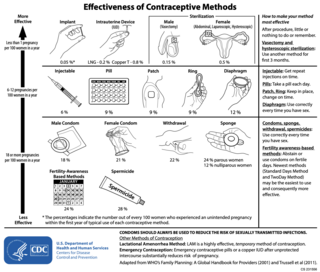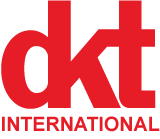
Family planning is the consideration of the number of children a person wishes to have, including the choice to have no children, and the age at which they wish to have them. Things that may play a role on family planning decisions include marital situation, career or work considerations, financial situations. If sexually active, family planning may involve the use of contraception and other techniques to control the timing of reproduction.
Reproductive rights are legal rights and freedoms relating to reproduction and reproductive health that vary amongst countries around the world. The World Health Organization defines reproductive rights as follows:
Reproductive rights rest on the recognition of the basic right of all couples and individuals to decide freely and responsibly the number, spacing and timing of their children and to have the information and means to do so, and the right to attain the highest standard of sexual and reproductive health. They also include the right of all to make decisions concerning reproduction free of discrimination, coercion and violence.
Male contraceptives, also known as male birth control, are methods of preventing pregnancy by interrupting the function of sperm. The main forms of male contraception available today are condoms, vasectomy, and withdrawal, which together represented 20% of global contraceptive use in 2019. New forms of male contraception are in clinical and preclinical stages of research and development, but as of 2024, none have reached regulatory approval for widespread use.

Sexual and reproductive health (SRH) is a field of research, health care, and social activism that explores the health of an individual's reproductive system and sexual well-being during all stages of their life. Sexual and reproductive health is more commonly defined as sexual and reproductive health and rights, to encompass individual agency to make choices about their sexual and reproductive lives.

Population Services International (PSI) is a 501(c)(3) registered nonprofit global health organization that began as an international not-for-profit provider of contraception and safe abortion services, and has evolved into developing and deploying programs today that target malaria, child survival, HIV, and reproductive health. PSI provides products, clinical services and behavior change communications for the health of people in high-need populations.

There are many methods of birth control that vary in requirements, side effects, and effectiveness. As the technology, education, and awareness about contraception has evolved, new contraception methods have been theorized and put in application. Although no method of birth control is ideal for every user, some methods remain more effective, affordable or intrusive than others. Outlined here are the different types of barrier methods, hormonal methods, various methods including spermicides, emergency contraceptives, and surgical methods and a comparison between them.

EngenderHealth is a 501(c)(3) nonprofit organization based in Washington, D.C., with a focus in sexual and reproductive health (SRH). The organization operates in nearly 20 countries throughout Africa, Asia, and North and South America.
Contraceptive security is an individual's ability to reliably choose, obtain, and use quality contraceptives for family planning and the prevention of sexually transmitted diseases. The term refers primarily to efforts undertaken in low and middle-income countries to ensure contraceptive availability as an integral part of family planning programs. Even though there is a consistent increase in the use of contraceptives in low, middle, and high-income countries, the actual contraceptive use varies in different regions of the world. The World Health Organization recognizes the importance of contraception and describes all choices regarding family planning as human rights. Subsidized products, particularly condoms and oral contraceptives, may be provided to increase accessibility for low-income people. Measures taken to provide contraceptive security may include strengthening contraceptive supply chains, forming contraceptive security committees, product quality assurance, promoting supportive policy environments, and examining financing options.
Long-acting reversible contraceptives (LARC) are methods of birth control that provide effective contraception for an extended period without requiring user action. They include hormonal and non-hormonal intrauterine devices (IUDs) and subdermal hormonal contraceptive implants. They are the most effective reversible methods of contraception because their efficacy is not reliant on patient compliance. The failure rates of IUDs and implants is less than 1% per year.

Birth control, also known as contraception, anticonception, and fertility control, is the use of methods or devices to prevent unintended pregnancy. Birth control has been used since ancient times, but effective and safe methods of birth control only became available in the 20th century. Planning, making available, and using human birth control is called family planning. Some cultures limit or discourage access to birth control because they consider it to be morally, religiously, or politically undesirable.
Unintended pregnancies are pregnancies that are mistimed or unwanted at the time of conception, also known as unplanned pregnancies.

DKT International (DKT) is a charitable non-profit organization that promotes family planning and HIV prevention through social marketing. The Washington, D.C.-based DKT was founded in 1989 by Phil Harvey and operates in 90 countries in Africa, Asia, and Latin America. Its revenue largely comes from sales of low-cost contraceptives. In 2023, DKT sold 949.58 million condoms, 120 million units of oral contraceptives, 33 million injectable contraceptives, 28.6 million emergency contraceptives and 5.4 million intrauterine devices (IUDs), among other products, in over 60 countries. This is equivalent to 64.1 million couple years of protection (CYPs), making DKT one of the largest private providers of contraceptives in the developing world. The average cost per CYP was US$1.65. DKT's marketing strategies have included advertising, creating location-specific brands, working with social networks and militaries, and targeting high-risk groups. DKT also works with health workers and clinics that provide family planning products, information, and services. Charity Navigator has given DKT a four-star rating for its finances, with 96.5% of its budget going towards programs and 3.4% towards headquarters expenses and fund raising in 2019.
Dr Timothy Reuben Ladbroke "Tim" Black CBE was a family planning pioneer, a founding director of Population Services International (PSI) in Chapel Hill, North Carolina, and later founder of Marie Stopes International (MSI) in London.

Birth control in the United States is available in many forms. Some of the forms available at drugstores and some retail stores are male condoms, female condoms, sponges, spermicides, over-the-counter progestin-only contraceptive pills, and over-the-counter emergency contraception. Forms available at pharmacies with a doctor's prescription or at doctor's offices are oral contraceptive pills, patches, vaginal rings, diaphragms, shots/injections, cervical caps, implantable rods, and intrauterine devices (IUDs). Sterilization procedures, including tubal ligations and vasectomies, are also performed.
Reproductive coercion is a collection of behaviors that interfere with decision-making related to reproductive health. These behaviors are meant to maintain power and control related to reproductive health by a current, former, or hopeful intimate or romantic partner, but they can also be perpetrated by parents or in-laws. Coercive behaviors infringe on individuals' reproductive rights and reduce their reproductive autonomy.

Globally approximately 45% of those who are married and able to have children use contraception. As of 2007, IUDs were used by about 17% of women of child bearing age in developing countries and 9% in developed countries or more than 180 million women worldwide. Avoiding sex when fertile is used by about 3.6% of women of childbearing age, with usage as high as 20% in areas of South America. As of 2005, 12% of couples are using a male form of contraception with rates of up to 30% in the developed world.
Abortion in Uganda is illegal unless performed by a licensed medical doctor in a situation where the woman's life is deemed to be at risk.
Contraceptive rights in New Zealand are extensive. There are many options available to women seeking contraception. There are also options for men. Government funding keeps the cost of most types of contraception low in most cases. Family planning options in New Zealand are generally in keeping with the United Nations stance towards sexual and reproductive rights although the country has received criticism in some aspects.

Abortion in Kenya is prohibited with the exception of certain circumstances including danger to the life and health of the expectant mother, and rape. Unsafe abortions are a major cause of deaths and health complications for women in Kenya.
In Madagascar, abortion is illegal in all circumstances. The abortion law punishes receiving or assisting in an abortion with imprisonment or fines. It is one of the only countries with a total abortion ban. Abortion has been illegal since the French colonial era, influenced by attitudes favoring increased births. In 2017, the government rejected a proposal to legalize therapeutic abortion. A bill allowing abortion in the case of rape was proposed by Member of Parliament Masy Goulamaly in November 2021 but was withdrawn by the parliament.









